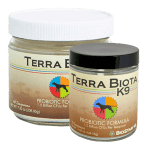
Living Off the Land: Health Benefits of Soil-Based Organisms
I like to get dirty. I like to roll in grass, dirt, and leaves. I like to swim in creeks, run through mud, lie in patches of freshly raked garden soil. These are some of the benefits of being a farm dog, and I would know. What I didn’t know, is that all this dirt is good for me.
You see, when our canine ancestors were hanging out with your human ancestors, we ate what they ate: wild game, some vegetables and berries. Our ancestors and your ancestors were in constant contact with dirt. And in the dirt lived a rich colony of soil-based organisms, which meant that both canines and humans shared a symbiotic relationship with certain bacteria and yeasts, benefiting us and the microbes. This relationship was especially valuable to human and canine GI tracts.
What are soil-based organisms, you ask?
These are the probiotic strains of bacteria commonly found in healthy soil, and grown in monitored environments for dietary supplementation. Soil-based organisms are specifically from the genus Bacillus. These bacteria form a seed-like structure that makes them more hardy and able to survive their journey through the stomach, unlike lactobacteria and bifidobacteria. Soil-based organisms form spores that can withstand stomach acid, bile, and pancreatic enzymes. Their chief place of residence and colonization is the large intestine. Once in the large intestine, the “seed” of the Bacillus cell emerges from dormancy.
The most common species of beneficial soil-based organisms include Bacillus coagulans and Bacillus subtilis, as well as a specific yeast strain known as Saccharomyces thermophilus.
Difference between soil-based organisms and other probiotics
Research has shown that soil-based organisms take up residence in the gut, unlike non-spore probiotics such as lactobacteria and bifidobacteria that are mostly transient. Because these types of bacteria are easily destroyed by stomach acids, bile, and pancreatic enzymes, high amounts of “colony-forming units” (CFUs) are needed in probiotic supplements. Soil-based organisms aren’t needed in high CFU counts because of their high resistance to digestion.
Food yesterday and today
 My canine ancestors and your human ancestors ate a lot of dirt. The dirt came from the plants they ate — no triple-washing the spinach, no hand sanitizers. The animal meat they ate wasn’t thoroughly washed either; it was gutted and skinned, then cooked. Those humans who grew their own food pulled carrots out of the garden, maybe dusted them off, and then ate them. By being less obsessed with how “clean” the food was, they received the beneficial soil-based bacteria from the plants they grew, as well as the plants in the intestines of the animals these humans — and we canines — ate.
My canine ancestors and your human ancestors ate a lot of dirt. The dirt came from the plants they ate — no triple-washing the spinach, no hand sanitizers. The animal meat they ate wasn’t thoroughly washed either; it was gutted and skinned, then cooked. Those humans who grew their own food pulled carrots out of the garden, maybe dusted them off, and then ate them. By being less obsessed with how “clean” the food was, they received the beneficial soil-based bacteria from the plants they grew, as well as the plants in the intestines of the animals these humans — and we canines — ate.
At this point, we mammals are made of more bacterial cells and genes than our own!
Our soils today
Modern farming methods include deep tilling, pesticides, herbicides, and chemical fertilizers to improve the yield. This focus on producing more per acre has resulted in a disruption of the soil ecosystem and soil microbiota. Canines and humans are not getting the soil-based organisms we need. Thankfully, there is a rise in regenerative farming to help support the soil web ecosystem and the beneficial bacteria it includes.
Dogs who live in suburbs are exposed to pesticides, herbicides, and chemical fertilizers, which may produce a green lawn, but at a potentially high health cost to the dog.
I say, “Let your dogs get dirty!” Not, of course, rolling on some Roundup Ready patch of lawn, but in the woods or on a forest walk. Or, if your backyard is free of chemicals, let your dog roll!
Benefits of soil-based organisms for dogs:
- Support a healthy gastrointestinal tract
- Can reduce bloating and gas
- Are beneficial for autoimmune conditions by supporting production of the immunoglobulins, specifically IgA
- Can assist gut-repair pathways, which is particularly important for dogs with irritable bowel syndrome (IBS)
My human likes dirt. Does yours?

My human never washes the vegetables she grows. She may shake off a dirt-encrusted beet, but that’s about it. Of course, she knows how her vegetables are grown, and as we hear her so often say, “Dirt is Mother Earth’s seasoning.” Her hands get dirty daily from barn chores and garden work and yet there isn’t one jar or dispenser of anti-bacterial soap anywhere in the house. The closest thing to anti-bacterial she has on hand is colloidal silver and manuka honey.
There is reasoning behind this: more exposure to microbes supports the diverse colonies of bacteria we host, from our skin to our GI tract.
BioStar’s Terra Biota K9 probiotic with soil-based organisms
 BioStar’s Terra Biota K9 provides 12 different strains of beneficial bacteria including the soil-based organisms, along with bentonite clay to absorb toxins, and a blend of Chinese medicinal mushrooms, and voila! — a composite of the best features found in healthy soil: beneficial bacteria, clay, and fungi. Terra Biota K9 provides all the health benefits of healthy soil — without the dirt.
BioStar’s Terra Biota K9 provides 12 different strains of beneficial bacteria including the soil-based organisms, along with bentonite clay to absorb toxins, and a blend of Chinese medicinal mushrooms, and voila! — a composite of the best features found in healthy soil: beneficial bacteria, clay, and fungi. Terra Biota K9 provides all the health benefits of healthy soil — without the dirt.
And for the humans looking to stay clean, but who want a healthy colony of microorganisms (including the soil-based organisms) in their body, consider Garden of Life’s Primal Defense probiotic.
Soil-based organisms are as beneficial to us now as they were to our canine ancestors and your human ancestors. For all of us, health begins in the gut.










